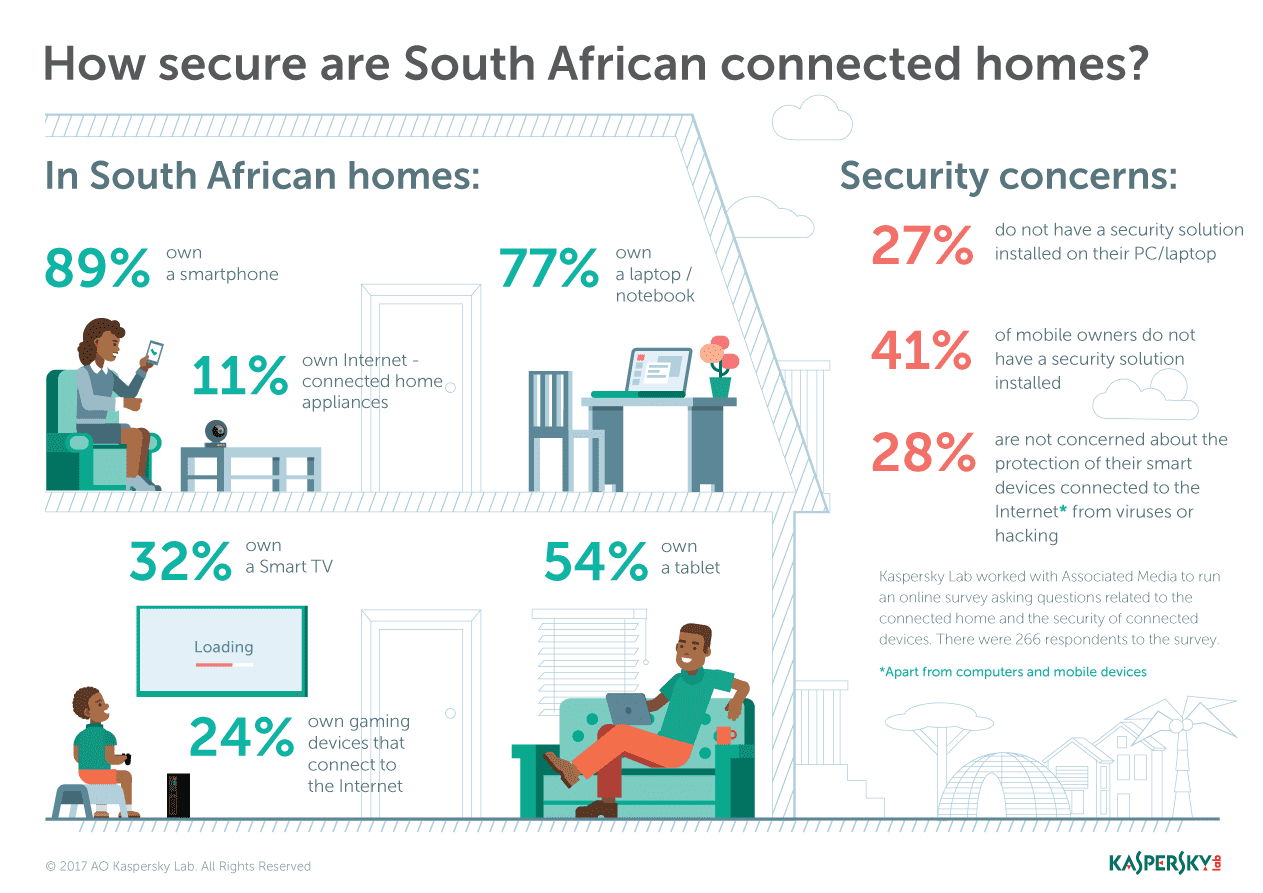As the Internet of Things (IoT) continues to increase in popularity globally, a recent survey* was commissioned by Kaspersky Lab in South Africa.
As the Internet of Things (IoT) continues to increase in popularity globally, a recent survey* was commissioned by Kaspersky Lab in South Africa, to gain an understanding on how secure connected homes are in the local region. The results highlight South African’s top concerns regarding their connected lifestyles – which indicate a clear need for a more proactive strategy towards IT security of connected homes and lifestyles, for better overall protection.
When asked about the devices owned, that make up their connected homes, the survey showed that 89% of respondents own a smartphone, 77% own a laptop/notebook, 54% own a tablet, 32% own a Smart TV and 24% own gaming devices that connect to the Internet. Furthermore, 11% own Internet-connected home appliances.
Says Riaan Badenhorst, General Manager, Kaspersky Lab Africa; “These figures demonstrate that most of our professional and personal lives have become ‘digital’ and digitally integrated today. Whether at home or while on the move, this connected lifestyle offers ample opportunity, ease and convenience. However, it also comes with some very serious cyber related risks that shouldn’t be ignored, especially as we see more cybercriminals eagerly looking for ways to take advantage of the growing IoT trend. There are some very real, and valued, concerns linked to a connected lifestyle and a connected home. And I cannot stress enough how this needs to be addressed adequately, with effective IT security measures.”

A top concern raised in the survey (67%) was financial cyberthreats targeting user’s accounts, resulting in monetary loss. Further to this, 64% voiced concern around phishing emails/websites that try to collect details and 60% about online account hacking – which can also result in financial and identity damage.
“These statistics indicate that South African consumers are highly concerned around their online security. However, a very alarming statistic is that, the same survey shows that only 50% of respondents’ devices are up-to-date with all the latest security and firmware updates that the platforms of these devices offer,” says Badenhorst.
The survey also indicated that 59% of users who own a desktop PC or laptop and 51% a smartphone or tablet PC, stated that they are very concerned about the protection of these devices from viruses and hacking. Yet, only 73% (PC/laptop owners) and more worryingly 57% (mobile), respectively, have a security solution installed on these devices. When considering other smart devices that connect to the Internet, such as a Smart TV or baby monitor, only 38% of respondents expressed high concern for these devices falling target to viruses or hacking.
Continues Badenhorst; “This lack of security is a disturbing reality and has provided a clear case for much stronger consumer education around their exposure to potential threats, especially in the mobile space where mobility is a key driver of the connected lifestyle.”
“Cybercriminals are becoming more sophisticated in their tactics each day and it is no longer okay to merely be aware about the security threats but rather, the protection of these devices needs to be taken much more seriously. Furthermore, given the lower concern expressed for devices that make up a connected home, we have to ask, are local device users really aware of the threat the connected home can pose to their family and why they need to take serious action? In many cases, instead of making life easier for their owners, connected devices are increasingly becoming a weak link in consumers’ overall security”.
According to analytical data from Gartner, over six billion IoT devices are currently being used worldwide, and many of them have already fallen victim to cybercriminals. While it may be possible to avoid shady websites and risky downloads, the act of being connected to the Internet and operating a connected home opens users up to passive risks such as drive-by-downloads and network-sniffing hackers.
Concludes Badenhorst; “These tactics put users (and their families) in danger and it is therefore critical for users to take corrective action, to be proactive around the security of their connected homes and devices, just as they would prioritise physical security, with the investment in strong and reliable security solutions.”
Kaspersky Lab offers a number of products to assist, including free solutions such as the recently launched beta version of Kaspersky IoT Scanner – a solution for the "smart" home and the Internet of Things, as well as Kaspersky Free – a free user-friendly solution that provides basic features to secure users from the most common cyberthreats.
For more information, please visit: https://www.kaspersky.co.za/home-security#all
For more tips of how to stay protected, visit the Kaspersky Lab blog: https://www.kaspersky.com/blog/
*Kaspersky Lab worked with Associated Media to run an online survey asking questions related to the connected home and the security of connected devices. There were 266 respondents to the survey.




